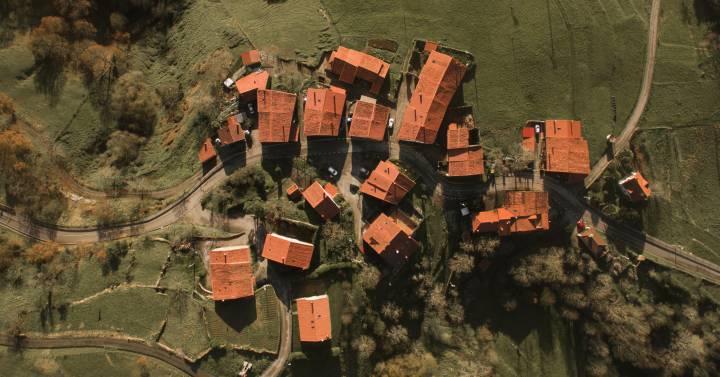Multidisciplinary and close: this is how village lawyers are
During confinement, some lawyers happily announced on networks that they were emigrating to the countryside. Not a few boasted of the wonders of enjoying the natural environment and the tranquility they breathed. But, beyond an experience for urbanites, working in the town is the day to day for a large number of lawyers.
The village lawyers make up a category with roots, personal treatment and empathy. They are specialists in solving the problems of their neighbors, so they cannot handle only one type of business. Faced with the current of hyper specialization, they have no choice but to be generalists. While their city colleagues are required to have business instincts, they cultivate patience and deal with the lack of anonymity and the “since I see you around here, I ask you”.
From scratch
Opening an office in a town is a decision that sometimes comes by chance. This was the case of Jon Andoni Bengoetxea, a lawyer in Durango, a Biscayan municipality of 30,000 inhabitants. In hindsight, the lawyer acknowledges that "when you start from scratch, it is much easier to make your way in a town than in a city." One of the reasons, he points out, is that "word of mouth spreads more and better." If, in addition, you have roots or ties to the locality, "it is also easier for people with whom you have contacts to become clients."
After twenty-eight years, Bengoetxea is proud to be a lawyer in Durango and sees "many advantages" in practicing, in his case as a business lawyer, from a medium-sized town. “I could have gone to Bilbao, but I decided to stay here because I like a more personal treatment”. This translates into a special care for customers, with whom he creates "links of trust". Also in the closeness with the court officials, whom "you greet by his name." A proximity that sometimes turns against us. "The least good part is when you meet clients on the weekend," acknowledges the lawyer.
Populations of a certain size, such as Almendralejo (Badajoz) with 33,000 inhabitants, offer a market share and a quality of life that Mercedes Pérez-Olleros does not renounce. After thirty years of practice, she does not consider making the leap to the capital, although she recognizes that in the village the anonymity of the big city is lost. The lawyer handles, above all, commercial, in addition to other civil matters. Some of them, typical of rural areas, such as the demarcations or registration of farms that, however, today "are already residual". As the capital of the region, Almendralejo has brought together relevant operations in the wine and olive sector. “In the old days, until the bankruptcy law, all suspensions of payment were carried out in the court here”.
A little of everything
When it is exercised in a town like Laredo (Cantabria) with 11,000 inhabitants, explains Mónica San Román, it is important to touch all branches of law. Although she is mainly dedicated to family issues, the lawyer says that “all kinds of things” come into her office. Of course, "you have to know very well in which squares you cannot fight". Years ago they won a case of a "raped mare" by a horse that jumped into their client's paddock. She was pregnant and "we got compensation for the ill-fated foal." Witnesses and a breeder had to be brought to the trial to determine the value of the jaco And the typical issue of "the incredible growing farm next to the extraordinary shrinking farm" can always come, he narrates, in which you have to find countrymen who know where the milestone or mark was.
That extra effort is amply offset by the advantages of living and working in the town. "Everything is much more at hand here and the way of working is more comfortable," acknowledges San Román. This being at ease is what made him return from an office in Bilbao to settle definitively in his homeland.

One of the skills that the lawyer notes that she has developed the most is that of conciliation or mediation, "always trying to reach an agreement before going to trial." Being close to colleagues is a "tremendous advantage," she says. Of course, she looks with concern at the precariousness of the sector and the lack of means in the smallest towns. “As a town lawyer, she worries me that the courts of first instance will be removed,” she emphasizes.
Public service
Help the neighbors. This is what prompted Francisco Javier Blanco to dedicate himself first to the legal profession and, later, to govern the affairs of Cazalegas (Toledo, 1,800 inhabitants) as mayor of the municipality. Although the office is in neighboring Talavera de la Reina, the lawyer has a small office in the town and does not rule out turning it into a headquarters. He enjoys his profession so much that he was not released when he was elected alderman.
Fran, as he is known in the place, is happy to be "someone close" to whom the countrymen can consult their problems. "They have me at hand," she appreciates. By pitching in, many times, he solves issues even altruistically. For years, he says, a very old couple thanked him for his work to demarcate a farm that came from generations and about which there was confusion in the Registry.
Empathy is the virtue that Blanco claims to have developed the most. “I have come to act not only as a lawyer, but as a psychologist, confessor…”. Now, he emphasizes, "I try to mark the professional line." Set guidelines so that the overconfidence typical of peoples does not turn the problem of others into a personal matter. The lawyer claims the obstacles that the smallest populations have: digital gap and "a lot of ignorance regarding the instruments to assert their rights."
The digitization of justice helps, but it can also be a handicap for older people. This is how Juan Carlos Benítez thinks, who combines the legal profession with the mayor's office of Oliva de Mérida (Badajoz, 1,700 inhabitants). When he finished in his old company, he began to collaborate with an office in the neighboring town of Guareña (6,800 inhabitants). The countrymen from Oliva, who already knew him, began to knock on his door with various matters. “Word was spreading, generating more clients,” he recalls. He handles labor and civil matters, but, like all small-town firms, he says, "we are multidisciplinary."
The consistory, he admits, steals a lot of his time despite having a partial dedication. "If I see that a case comes to me that I am not going to be able to deal with, I refer it to a colleague in the office." Being mayor has earned him, on the other hand, some enmity and loss of clients who do not understand the incompatibilities. “You can't be judge and jury”, he tries to explain to them.
For Benítez, the difference with a city lawyer is in the personal treatment. In the town, "they treat you more than you to you". A familiarity that, sometimes, becomes ungrateful. “They have seen you grow up since you were a child and they do not value you the same.”
There are also "very grateful" people. Benítez knows the situation of his neighbors. There are countrymen to whom he directly does not charge or lets them pay him "however they can." That, he affirms, "is the only thing that, really, I am still proud of, helping people." As a learned virtue, he stresses "patience." “You never finish, you go out to the street door and there is always some local who wants to ask you: just like the Legálitas phone number”.
Good agreement
A peculiar geographical environment for lawyers is the island. Alván Gómez is a lawyer in Tenerife, but he assists clients in all the islands of the Canary archipelago. "The fundamental difference is that in the capital the problems are a bit more sophisticated," he says. In the towns, "sometimes it is the lawyer himself who ends up resolving a matter between relatives." In this context, he underlines, "you develop a much more conciliatory facet and a quality of a psychologist."
For Gómez, the fundamental thing is "to go with sincerity ahead". "The lawyer who says this lawsuit is won, he is reckless," he says. In many cases, he insists, it is necessary to transmit the mythical phrase of the union of "a bad agreement is better than a good judgment". A few days ago, in La Gomera, he had an inheritance division case in which the parties were in conflict over the distribution of assets. Fortunately, an arrangement was reached: "a procedure can involve a brutal economic cost for the simple and plain reason that clients do not give their arm to twist".
The media, on the other hand, are what they are. In El Hierro or La Gomera, for example, there is a court for the entire island. In addition, "given the shortage of lawyers, it is common for them to hire lawyers from the larger islands."
Another of the characteristics of cases in towns is that "they demand a great deal of the physical presence of the lawyer," he says. In Gómez's case, it involves flying from one island to another, which is "an added cost." It is necessary, for example, “to study on the ground a water cut between two rural properties”. “You have to go, take out a piece of paper, make a sketch, etc., to try to visualize the reality of the fact that you are going to defend later in court.”
An important advance, he acknowledges, has been digitization. "It speeds up our work a lot." It is true, he adds, that "we must continue working along these lines to continue making things a little easier: the bureaucracy still exists".
Prices, says the lawyer, do not vary because it is a rural area. In this matter, Gómez criticizes that some colleagues devalue the work by not charging the first consultation. He is the same as the mechanic who gets paid to know how to fix the noise of the car, he exemplifies.
The professional life of a village lawyer depends, in short, on many circumstances. That yes, as Bengoetxea warns, we must banish the bucolic vision that in rural areas life is calmer because, simply, "it is not true, there is no such peaceful coexistence".
Andoni Bengoetxea. Lawyer in Durango (Bizkaia)
"When you start from scratch, it is much easier to make your way in a town than in a city; word of mouth spreads more and better in a medium-sized population"
Mónica San Román. Lawyer in Laredo (Cantabria)
"You can't specialize too much; you can always get the typical issue of the incredible growing farm next to the extraordinary shrinking farm"
Francisco Javier Blanco. Lawyer and mayor of Cazalegas (Toledo)
"We are like a big family. I have come to act not only as a lawyer, but also as a psychologist, confessor... Confidence makes you transmit empathy"
Juan Carlos Benítez. Lawyer and mayor of Oliva de Mérida (Badajoz)
"In the town they treat you more like you. They've seen you grow up since you were a child and you don't impose so much on them; that means that some people don't value you the same as a city lawyer"
Alván Gómez. Lawyer in Tenerife (Canary Islands)
"The difference is that in the capital the conflicts are a little more sophisticated; in the towns you develop a more conciliatory facet"







![47 best antiage nutritive cream in 2022 [based on 326 reviews] 47 best antiage nutritive cream in 2022 [based on 326 reviews]](https://website-google-hk.oss-cn-hongkong.aliyuncs.com/drawing/article_results_6/2022/2/27/1918fc37c66ad30564173e69d9df88a0.jpeg)
